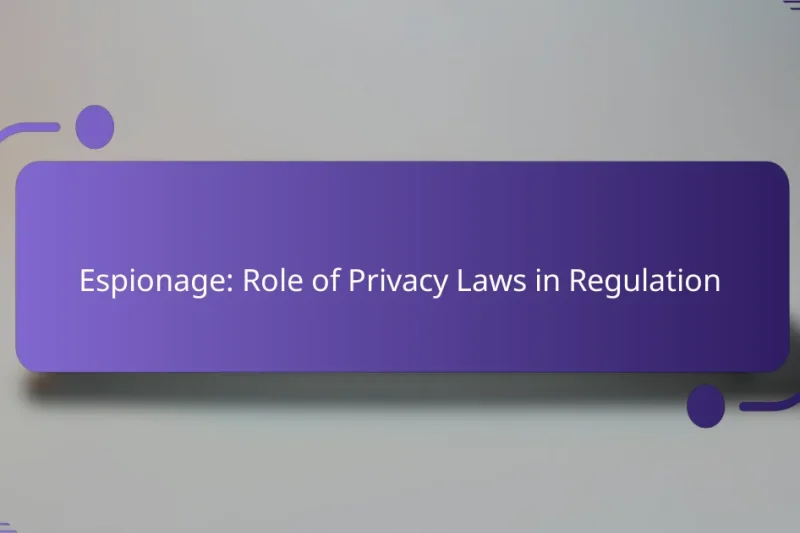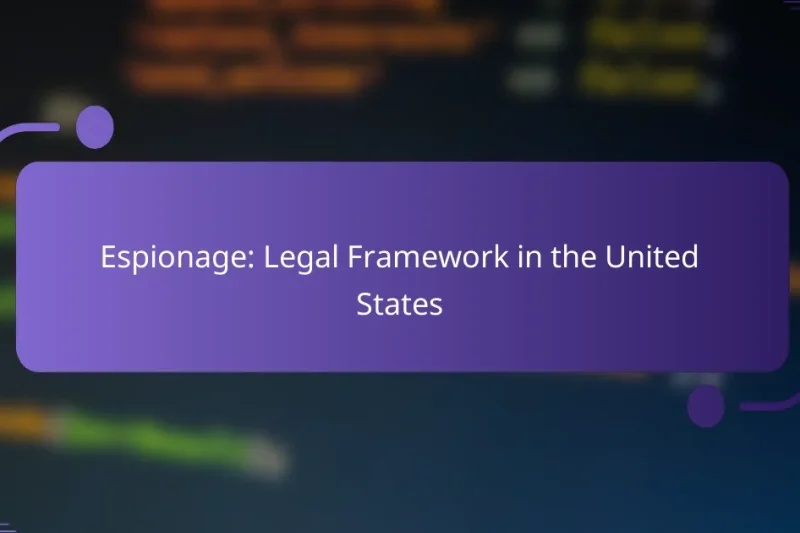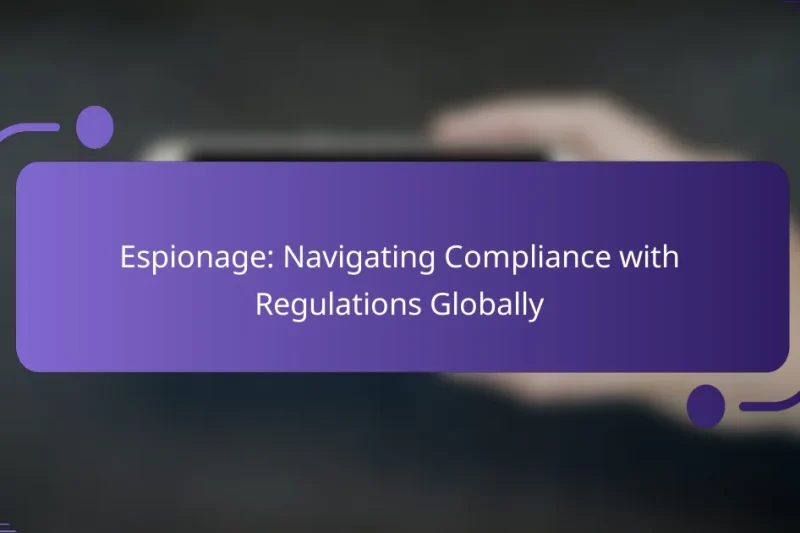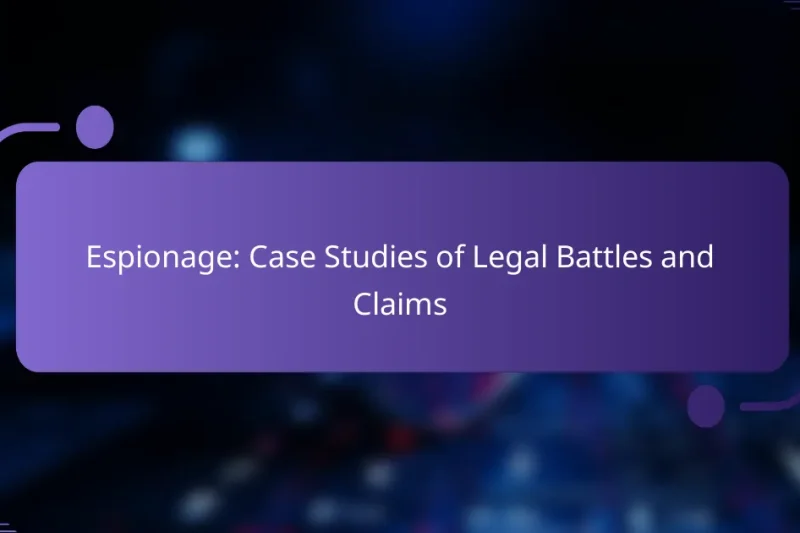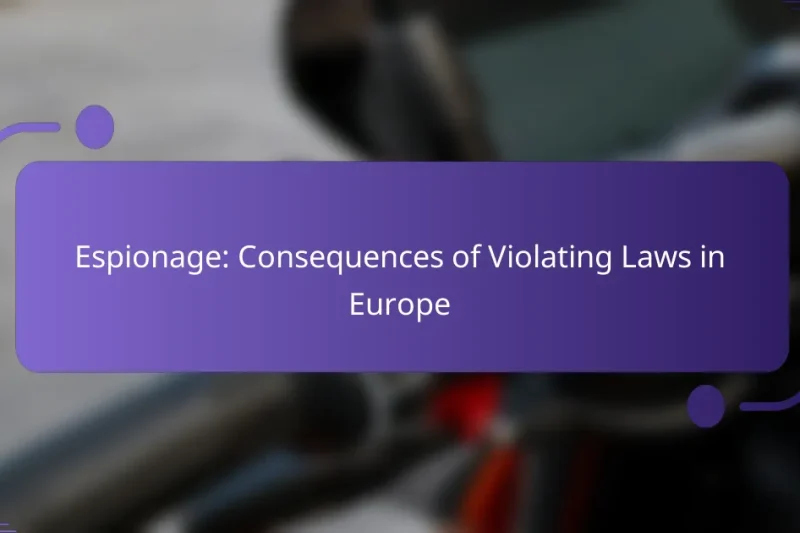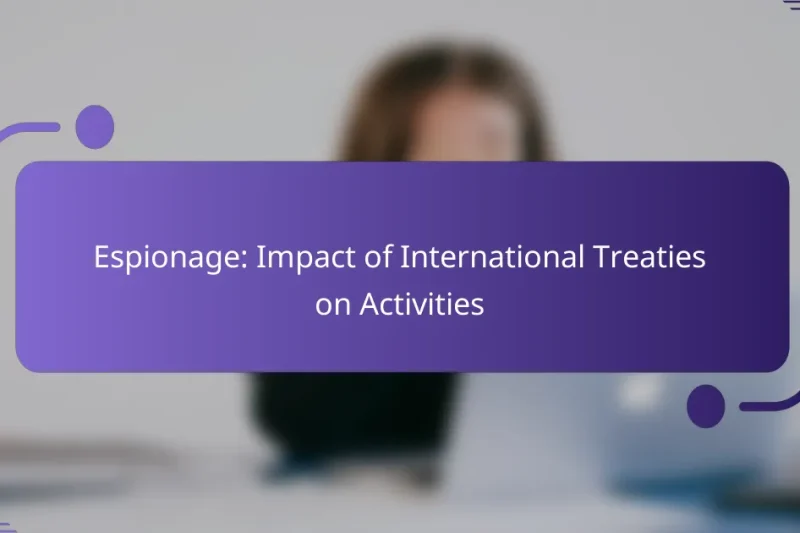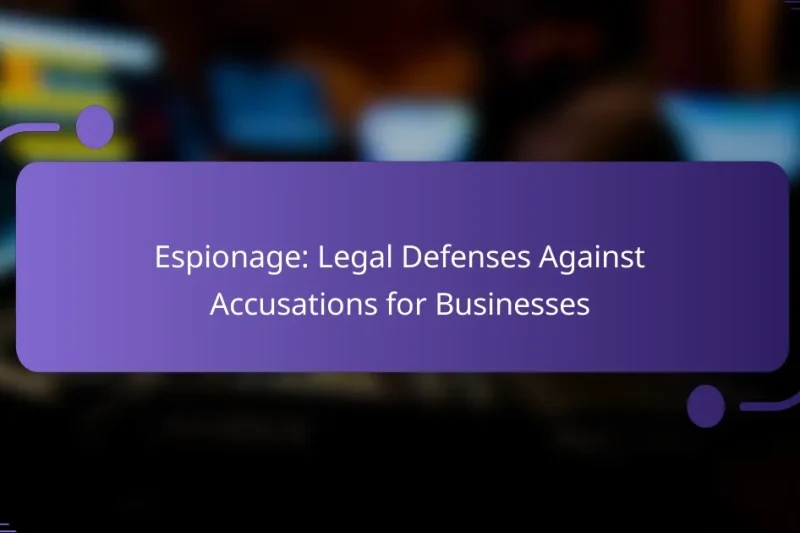Privacy laws play a critical role in regulating espionage by establishing a framework that balances national … Espionage: Role of Privacy Laws in RegulationRead more
Espionage Legal Aspects: What You Should Know
Understanding the legal aspects of espionage is crucial, as it carries severe consequences under both U.S. federal law and international norms. Espionage involves unauthorized gathering of confidential information, leading to significant criminal and civil penalties. While international law addresses espionage through treaties and customary practices, the lack of a comprehensive framework means that legal implications can vary widely across different countries.
Espionage: Legal Framework in the United States
Espionage in the United States is defined as the act of gathering or transmitting defense information … Espionage: Legal Framework in the United StatesRead more
Espionage: Navigating Compliance with Regulations Globally
Espionage compliance is a critical concern for organizations operating globally, as regulations governing surveillance and intelligence … Espionage: Navigating Compliance with Regulations GloballyRead more
Espionage: Case Studies of Legal Battles and Claims
Espionage cases often present intricate legal battles that navigate the delicate balance between national security and … Espionage: Case Studies of Legal Battles and ClaimsRead more
Espionage: Consequences of Violating Laws in Europe
Espionage in Europe carries serious legal repercussions, including criminal charges, fines, and potential imprisonment, with penalties … Espionage: Consequences of Violating Laws in EuropeRead more
Espionage: Impact of International Treaties on Activities
International treaties play a crucial role in shaping espionage activities by providing legal frameworks that govern … Espionage: Impact of International Treaties on ActivitiesRead more
Espionage: Legal Defenses Against Accusations for Businesses
In the United States, businesses facing espionage accusations have several legal defenses at their disposal, including … Espionage: Legal Defenses Against Accusations for BusinessesRead more
What are the legal implications of espionage in the United States?
The legal implications of espionage in the United States are severe, involving both criminal and civil consequences. Espionage typically refers to the act of spying or gathering confidential information without authorization, which can lead to significant penalties under federal law.
Criminal charges for espionage
In the U.S., espionage is primarily governed by the Espionage Act of 1917, which makes it a federal crime to obtain or disclose national defense information with the intent to harm the United States or benefit a foreign nation. Convictions can lead to lengthy prison sentences, often ranging from several years to life imprisonment, depending on the severity of the offense.
Common charges include gathering or transmitting defense information, conspiracy to commit espionage, and aiding a foreign government. Each charge carries its own set of penalties, and the prosecution must prove intent and knowledge, making legal representation crucial.
Civil liabilities for espionage
In addition to criminal charges, individuals accused of espionage may face civil liabilities, including lawsuits for damages. Affected parties, such as companies or government agencies, can seek compensation for losses incurred due to unauthorized information disclosure or theft.
Victims may pursue claims under various legal theories, including breach of contract or misappropriation of trade secrets. Civil penalties can be substantial, often amounting to millions of dollars, depending on the extent of the damage and the information involved.
Defenses against espionage charges
Defending against espionage charges can involve several strategies, including challenging the intent or knowledge required for a conviction. For instance, demonstrating that the accused did not knowingly disclose sensitive information can be a strong defense.
Another common defense is the argument of entrapment, where the accused claims they were induced to commit the crime by law enforcement. Additionally, asserting that the information was obtained legally or was already in the public domain can also mitigate charges.
How does international law address espionage?
International law addresses espionage primarily through a combination of treaties and customary practices, but it lacks a comprehensive legal framework. Espionage is often viewed as a violation of sovereignty, yet many countries tolerate it under the principle of state security. The legal implications can vary significantly based on the context and the nations involved.
International treaties on espionage
There are few international treaties that explicitly regulate espionage, as it is often considered a state secret and a matter of national security. The United Nations Charter emphasizes respect for sovereignty, which can be interpreted as a prohibition against espionage. However, treaties like the Vienna Convention on Diplomatic Relations provide some guidelines on diplomatic immunity, which can indirectly relate to espionage activities.
Additionally, specific agreements, such as mutual legal assistance treaties (MLATs), may facilitate cooperation between countries in prosecuting espionage-related offenses, although these treaties do not directly address the act of espionage itself.
Differences in national laws
National laws regarding espionage can differ widely, reflecting each country’s approach to national security and intelligence operations. In the United States, for example, espionage is criminalized under the Espionage Act, which outlines severe penalties for unauthorized information disclosure. In contrast, countries like Russia have their own stringent laws that can impose harsh consequences for espionage, often extending to foreign nationals.
These differences can lead to complex legal scenarios, especially in cases involving dual nationals or individuals operating in multiple jurisdictions. Understanding the specific laws of the relevant countries is crucial for anyone involved in or affected by espionage activities.
What are the penalties for espionage in various countries?
Penalties for espionage vary significantly across countries, often reflecting the severity with which each nation views the act. Generally, these penalties can include lengthy prison sentences, hefty fines, or even capital punishment in some jurisdictions.
Penalties in the United States
In the United States, espionage is a serious federal crime, typically prosecuted under the Espionage Act. Convictions can lead to imprisonment ranging from several years to life, depending on the severity of the offense and the classified information involved.
For example, leaking classified information can result in a sentence of up to 10 years for each violation. Additionally, fines can be imposed, which may reach into the hundreds of thousands of dollars, depending on the case specifics.
Penalties in the United Kingdom
The United Kingdom treats espionage under the Official Secrets Act, which imposes strict penalties for unauthorized disclosure of sensitive information. Offenders can face up to 14 years in prison for serious breaches involving national security.
In less severe cases, penalties may include shorter prison terms or fines. The UK government also has the authority to impose civil penalties, which can include restrictions on employment in sensitive positions.
Penalties in China
In China, espionage is considered a grave offense, with severe penalties outlined in the National Security Law. Those convicted of espionage can face long prison sentences, often ranging from 10 years to life imprisonment, depending on the nature of the espionage activities.
In extreme cases, particularly those involving state secrets, the death penalty may be applied. The Chinese legal system emphasizes strict enforcement, and foreign nationals are not exempt from these laws.
How can businesses protect themselves from espionage?
Businesses can protect themselves from espionage by implementing robust security measures and fostering a culture of awareness among employees. This involves both physical and digital safeguards to deter unauthorized access to sensitive information.
Implementing security protocols
Establishing comprehensive security protocols is essential for safeguarding business assets. This includes measures such as access control systems, surveillance cameras, and secure data storage solutions. Regular audits and updates to these protocols help ensure they remain effective against evolving threats.
Consider adopting industry standards such as ISO 27001 for information security management. This framework provides guidelines for managing sensitive company information, helping to mitigate risks associated with espionage.
Employee training on espionage risks
Training employees on the risks of espionage is crucial for prevention. Regular workshops can educate staff about recognizing suspicious behavior, protecting sensitive information, and understanding the importance of confidentiality. This proactive approach can significantly reduce vulnerabilities within the organization.
Incorporate real-world scenarios and role-playing exercises in training sessions to enhance engagement and retention. Employees should be encouraged to report any suspicious activities without fear of reprisal, fostering a culture of vigilance and responsibility.
What are the ethical considerations in espionage?
Ethical considerations in espionage revolve around the morality of gathering information covertly and the potential harm it may cause. Key factors include the intent behind the espionage, the methods used, and the impact on individuals and society.
Ethics of corporate espionage
Corporate espionage involves the secret acquisition of trade secrets or confidential information from competitors. While some argue it drives innovation and competition, it raises ethical concerns about fairness and trust in business practices.
Companies engaging in espionage must consider the legal ramifications and potential damage to their reputation. Ethical guidelines suggest that firms should prioritize legitimate competitive strategies over deceitful practices.
Ethics of government espionage
Government espionage often aims to protect national security or gather intelligence on potential threats. However, it raises ethical questions about privacy rights and the extent to which governments can surveil their citizens or foreign entities.
Balancing national security interests with individual freedoms is crucial. Governments should adhere to legal frameworks and ethical standards to ensure that espionage activities do not infringe upon civil liberties or lead to unjust outcomes.
What are the emerging trends in espionage law?
Emerging trends in espionage law reflect the increasing complexity of international relations and technological advancements. Legal frameworks are evolving to address issues such as cyber espionage, data privacy, and the use of artificial intelligence in intelligence gathering.
Impact of technology on espionage
Technology significantly influences espionage practices, enabling both state and non-state actors to gather intelligence more efficiently. Cyber tools allow for remote surveillance and data extraction, often blurring the lines between legal and illegal activities.
For instance, the use of malware and hacking techniques has become prevalent, raising questions about jurisdiction and accountability. Countries are now grappling with how to regulate these technologies while balancing national security interests and individual privacy rights.
Future legal developments in espionage
Future legal developments in espionage are likely to focus on creating comprehensive frameworks that address the challenges posed by digital espionage. This may include international treaties that establish norms and standards for cyber activities among nations.
Additionally, as artificial intelligence continues to evolve, laws may need to adapt to regulate its use in intelligence operations. Stakeholders should stay informed about legislative changes and consider the implications of emerging technologies on existing espionage laws.
